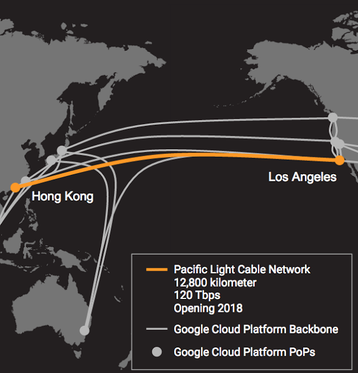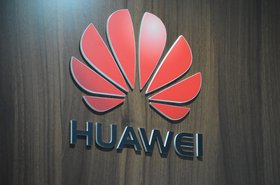The newly formed 'Team Telecom' has recommended that the FCC deny the Pacific Light Cable Network System submarine cable connecting the United States to Hong Kong.
The team was set up by executive order in April to review foreign participation in the US telecom services sector, and is part of the Department of Justice.
Reports earlier this year claimed that cable backers Google and Facebook already suspected that the US would block the cable, and were seeking a reduced license to connect to Taiwan and the Phillipines, respectively.
The 12,800km cable is mostly laid and ready to launch, but has been beset by issues. It was supposed to open in 2018, but has suffered set backs, as well as changes of ownership - with the four fiber pairs owned by PLDC shifting from Hong Kong steel and property magnate Wei Junkang to China's Dr. Peng Group, a telco company with alleged links to the state.
A decoupling
Team Telecom urged the FCC to grant the portions of PLCN’s application connecting the countries "which do not have any People’s Republic of China (PRC) based ownership and are separately owned and controlled by subsidiaries of Google LLC and Facebook, Inc., on the condition that the companies’ subsidiaries enter into mitigation agreements for those respective connections."
In April, the FCC granted Google’s request for Special Temporary Authority (STA) to commercially operate the segment of PLCN connecting the United States and Taiwan for six months, "based on obligations set forth in a Provisional National Security Agreement between Google and the US Departments of Justice, Homeland Security, and Defense."
The DoJ team claim that the 120Tbps system, which would have been the highest capacity submarine cable connection between the United States and Asia and the first direct connection to Hong Kong, "raised national security concerns." In a statement, they said this was "because a significant investor in the PLCN is Pacific Light Data Co. Ltd., a Hong Kong company and subsidiary of Dr. Peng Telecom & Media Group Co. Ltd. (Dr. Peng Group), the fourth largest provider of telecommunications services in the PRC."
Dr. Peng, the team claims, has an undefined "relationship with PRC intelligence and security services," as well as "obligations under PRC intelligence and cybersecurity laws." Separate reports claim the company helped build a surveillance network for the Beijing police.
Subsidiary Pacific Light Data is also connected to state-owned carrier China Unicom.
Beyond issues with the specific company behind the cable, the Team suggested it would block any cable connecting the US to Hong Kong, adding that other pending applications "would raise similar concerns."
It said it had "concerns that PLCN would advance the PRC government’s goal that Hong Kong be the dominant hub in the Asia Pacific region for global information and communications technology and services infrastructure, which would increase the share of US Internet, data, and telecommunications traffic to the Asia Pacific region traversing PRC territory and PRC-owned or -controlled infrastructure before reaching its ultimate destinations in other parts of Asia."
The group added: "The Committee’s recommendation specified that it was not in US national security or law enforcement interests to approve subsea cables landing in PRC territory when the PRC government has previously demonstrated the intent to acquire US persons’ data. The recommendation also explained that PLCN’s proposed Hong Kong landing station would expose US communications traffic to collection by the PRC.
"Such concerns have been heightened by the PRC government’s recent actions to remove Hong Kong’s autonomy and allow for the possibility that PRC intelligence and security services will operate openly in Hong Kong."
In 2013, it was revealed that the US National Security Agency tapped cable landing stations in the US - and, in partnership with GCHQ, the UK - giving it unrivaled access to data traversing the globe.



